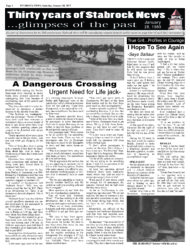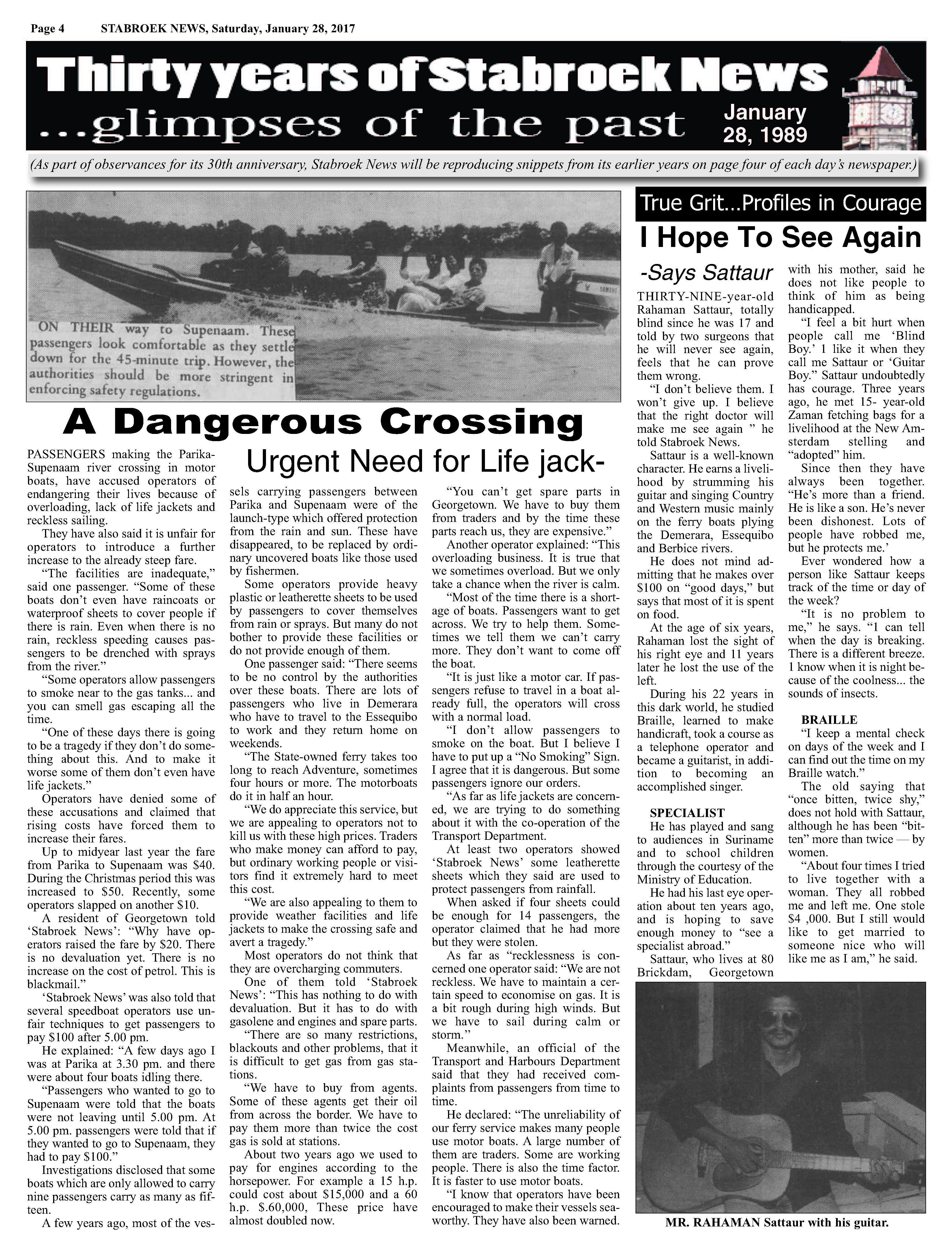Urgent Need for Life jackets
PASSENGERS making the Parika-Supenaam river crossing in motor boats, have accused operators of endangering their lives because of overloading, lack of life jackets and reckless sailing.
They have also said it is unfair for operators to introduce a further increase to the already steep fare.
“The facilities are inadequate,” said one passenger. “Some of these boats don’t even have raincoats or waterproof sheets to cover people if there is rain. Even when there is no rain, reckless speeding causes passengers to be drenched with sprays from the river.”
“Some operators allow passengers to smoke near to the gas tanks… and you can smell gas escaping all the time.
“One of these days there is going to be a tragedy if they don’t do something about this. And to make it worse some of them don’t even have life jackets.”
Operators have denied some of these accusations and claimed that rising costs have forced them to increase their fares.
Up to midyear last year the fare from Parika to Supenaam was $40. During the Christmas period this was increased to $50. Recently, some operators slapped on another $10.
A resident of Georgetown told ‘Stabroek News’: “Why have operators raised the fare by $20. There is no devaluation yet. There is no increase on the cost of petrol. This is blackmail.”
‘Stabroek News’ was also told that several speedboat operators use unfair techniques to get passengers to pay $100 after 5.00 pm.
He explained: “A few days ago I was at Parika at 3.30 pm. and there were about four boats idling there.
 “Passengers who wanted to go to Supenaam were told that the boats were not leaving until 5.00 pm. At 5.00 pm. passengers were told that if they wanted to go to Supenaam, they had to pay $100.”
“Passengers who wanted to go to Supenaam were told that the boats were not leaving until 5.00 pm. At 5.00 pm. passengers were told that if they wanted to go to Supenaam, they had to pay $100.”
Investigations disclosed that some boats which are only allowed to carry nine passengers carry as many as fifteen.
A few years ago, most of the vessels carrying passengers between Parika and Supenaam were of the launch-type which offered protection from the rain and sun. These have disappeared, to be replaced by ordinary uncovered boats like those used by fishermen.
Some operators provide heavy plastic or leatherette sheets to be used by passengers to cover themselves from rain or sprays. But many do not bother to provide these facilities or do not provide enough of them.
One passenger said: “There seems to be no control by the authorities over these boats. There are lots of passengers who live in Demerara who have to travel to the Essequibo to work and they return home on weekends.
“The State-owned ferry takes too long to reach Adventure, sometimes four hours or more. The motorboats do it in half an hour.
“We do appreciate this service, but we are appealing to operators not to kill us with these high prices. Traders who make money can afford to pay, but ordinary working people or visitors find it extremely hard to meet this cost.
“We are also appealing to them to provide weather facilities and life jackets to make the crossing safe and avert a tragedy.”
Most operators do not think that they are overcharging commuters.
One of them told ‘Stabroek News’: “This has nothing to do with devaluation. But it has to do with gasolene and engines and spare parts.
“There are so many restrictions, blackouts and other problems, that it is difficult to get gas from gas stations.
“We have to buy from agents. Some of these agents get their oil from across the border. We have to pay them more than twice the cost gas is sold at stations.
About two years ago we used to pay for engines according to the horsepower. For example a 15 h.p. could cost about $15,000 and a 60 h.p. $.60,000, These price have almost doubled now.
“You can’t get spare parts in Georgetown. We have to buy them from traders and by the time these parts reach us, they are expensive.”
Another operator explained: “This overloading business. It is true that we sometimes overload. But we only take a chance when the river is calm.
“Most of the time there is a shortage of boats. Passengers want to get across. We try to help them. Sometimes we tell them we can’t carry more. They don’t want to come off the boat.
“It is just like a motor car. If passengers refuse to travel in a boat already full, the operators will cross with a normal load.
“I don’t allow passengers to smoke on the boat. But I believe I have to put up a “No Smoking” Sign. I agree that it is dangerous. But some passengers ignore our orders.
“As far as life jackets are concerned, we are trying to do something about it with the co-operation of the Transport Department.
At least two operators showed ‘Stabroek News’ some leatherette sheets which they said are used to protect passengers from rainfall.
When asked if four sheets could be enough for 14 passengers, the operator claimed that he had more but they were stolen.
As far as “recklessness is concerned one operator said: “We are not reckless. We have to maintain a certain speed to economise on gas. It is a bit rough during high winds. But we have to sail during calm or storm.’’
Meanwhile, an official of the Transport and Harbours Department said that they had received complaints from passengers from time to time.
He declared: “The unreliability of our ferry service makes many people use motor boats. A large number of them are traders. Some are working people. There is also the time factor. It is faster to use motor boats.
“I know that operators have been encouraged to make their vessels seaworthy. They have also been warned.
True Grit…Profiles in Courage
I Hope To See Again
-Says Sattaur
THIRTY-NINE-year-old Rahaman Sattaur, totally blind since he was 17 and told by two surgeons that he will never see again, feels that he can prove them wrong.
“I don’t believe them. I won’t give up. I believe that the right doctor will make me see again ” he told Stabroek News.
Sattaur is a well-known character. He earns a livelihood by strumming his guitar and singing Country and Western music mainly on the ferry boats plying the Demerara, Essequibo and Berbice rivers.
He does not mind admitting that he makes over $100 on “good days,” but says that most of it is spent on food.
At the age of six years, Rahaman lost the sight of his right eye and 11 years later he lost the use of the left.
During his 22 years in this dark world, he studied Braille, learned to make handicraft, took a course as a telephone operator and became a guitarist, in addition to becoming an accomplished singer.
SPECIALIST
He has played and sang to audiences in Suriname and to school children through the courtesy of the Ministry of Education.
He had his last eye operation about ten years ago, and is hoping to save enough money to “see a specialist abroad.”
Sattaur, who lives at 80 Brickdam, Georgetown with his mother, said he does not like people to think of him as being handicapped.
“I feel a bit hurt when people call me ‘Blind Boy.’ 1 like it when they call me Sattaur or ‘Guitar Boy.” Sattaur undoubtedly has courage. Three years ago, he met 15- year-old Zaman fetching bags for a livelihood at the New Amsterdam stelling and “adopted” him.
Since then they have always been together. “He’s more than a friend. He is like a son. He’s never been dishonest. Lots of people have robbed me, but he protects me.’
Ever wondered how a person like Sattaur keeps track of the time or day of the week?
“It is no problem to me,” he says. “1 can tell when the day is breaking. There is a different breeze. 1 know when it is night because of the coolness… the sounds of insects.
BRAILLE
“I keep a mental check on days of the week and I can find out the time on my Braille watch.”
The old saying that “once bitten, twice shy,” does not hold with Sattaur, although he has been “bitten” more than twice — by women.
“About four times I tried to live together with a woman. They all robbed me and left me. One stole $4,000. But I still would like to get married to someone nice who will like me as I am,” he said.

